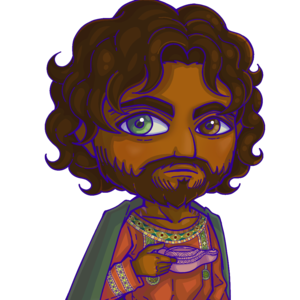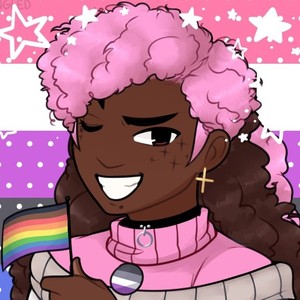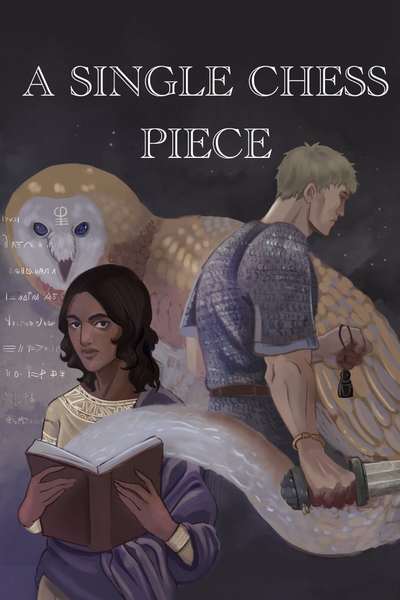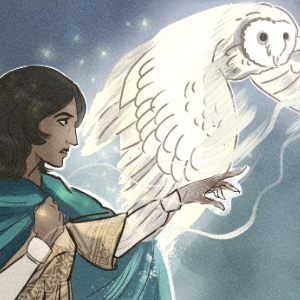Neposi castle stood on a large rocky slope, deep within the Chalkidiki peninsula. The roads there were not good. While the area boasted important monasteries and some pleasant villages, it had no big cities, and this meant no big roads. The main road passed just north of Chalkidiki. It lead all the way to Adrianople, and then, eventually, to Constantinople. So the mercenaries and their charges rode through uneven, sometimes rocky terrain. Horses tripped on roots and their hooves stirred up clouds of dust from the dry ground. Most of the time it was very quiet. Because of the civilians the journey was slow.
On the first night they came across the strewn bodies of a group of travelers. The dead people, Atsinganoi*, Rhode supposed, had very dark skin and wore layered clothing in many colors. A large wagon covered with canvas lay on its side, its wheels broken and its contents missing. Apart from the dead humans: men, women, even children, there were also dead animals littering the ground - a few large dogs and a bear. The horses which pulled the wagon were gone. The dead people had been robbed of anything even remotely valuable. Their attackers even took their shoes. Crows and ravens feasted on the bodies, sharing the meal with jackals and wild dogs.
Rhode tried not to look at the carnage. She wished she would never have to see a dead body again. Never hear the sound of animal jaws cracking bone. Never smell the smell of old blood and rotting flesh. Her cousins seemed as disturbed as she felt. The mercenaries, on the other hand, looked completely indifferent. Only one of Chlodvig’s soldiers, a blonde woman with long, wild hair, looked disturbed by the sight of the bodies. Upon her insistence the mercenaries piled the human bodies onto the wagon and set them aflame. It wasn’t much, argued the young mercenary, Eudoxia, but it was better than leaving them to rot along the road. Many of the mercenaries grumbled about Eudoxia being silly, but they went along with her wishes anyway.
Terwilla heaved a giant stone which had broken off a cliff some distance away and placed it by the wagon as a marker. Martina muttered a prayer for the dead as their group rode off, leaving the burning pyre behind them. Eirene, who rode next to her and Rhode, joined in, earning herself a grateful look from Martina.
On the next night, they found the people who had killed the Atsinganoi. A group of thirty men: Latins equipped in low quality armor and used weapons. More bandits than soldiers. Chlodvig’s team made short work of them. No one suggested building a pyre. Instead, Kurshan and Eudoxia collected the the belongings of the Atsinganoi, and the dead bandits’ weapons and horses. They loaded them onto one of the mercenaries' wagons and spoke no more of it.
Finally, on the third day, they saw the impressive castle towering before them. Rhode heard Sophia sigh, muttering ‘thanks be to the Allmighty’ under her nose. Even the horses seemed livelier. When they reached the iron gates of the castle a serious-faced, barrel-chested man in his late thirties came out to greet them. He was armored, and accompanied by three soldiers. After a brief, and quiet exchange of words with Chlodvig, he bowed to Michael and Sophia and ordered the gate to be opened. They rode through the gate, onto a small courtyard surrounded by walls. There were towers all along the walls. A paved path lead onto another courtyard, higher up. At the end of this upper courtyard, against the outer wall, stood stone-built buildings, the main tower, the stables and work areas.
As stable hands came out to take their horses, the officer who let them in introduced himself:
“My name is Aristotle Bouras. I’m in charge of this fort.”
Rhode stared upon hearing the name. She glanced in Chlodvig’s direction. He caught her eye and grinned, and Rhode felt herself smile a bit too. Here was another one bearing a pretentious name. Aristotle continued:
“Quarters have been prepared for your family in the east wing Lord Dokeianos.”
Michael nodded wearily.
“As for your men,” Aristotle turned to Chlodvig, “they can stay in the servants quarters next to the stables. You and your second in command can have rooms in the main castle.”
Sophia grimaced.
“Pardon my interruption officer, but that does not seem to appropriate! I would request that the hired soldiers stay out of the living areas where my daughters will be staying.
Aristotle Boutros looked at her confused. Then, as if realizing what she meant, he muttered, “I understand your concern’s Lady, but that would hardly be…uhm…polite…” he looked at Chlodvig nervously. Sophia’s sharp eyes caught the glance. She wondered why the commanding officer, Alexander's man, seemed so hesitant to slight the mercenary. She was no fool, and decided this might be important. Still, she did not like the idea of the mercenary, and his controversial second-in-command, sleeping in the main castle. It seemed like asking for trouble. Rhode had seemed much too comfortable around the man. And Sophia also noticed the blush on Martina's face whenever the mercenary woman helped her onto the wagon.
Her problem was solved by Chlodvig himself; he shrugged his shoulders and said that he always shared the same quarters his soldiers did. With that settled, servants let the Dokeianos family up the steps and into the main castle.
*
Rhode and her cousins recieved a whole floor to themselves. Four small bedrooms and a larger sitting room. The room was clean and neat but austere. Their window looked out onto the courtyard. A servant brought in hot water and tubs, and they bathed, scrubbing of the dirt from the journey. Then they slumped to finally get a good night’s rest.
Rhode felt that the warm bath in scented water, and the soft bed were a very welcome change. The last few days, excitement and sense of freedom notwithstanding, were extremely uncomfortable. Her back and legs ached. Her hair was messy and felt greasy. She hated being grimy, she hated having dirt under her nails. She hated lying on a thin pallet bed, covered with only a rough blanket. She detested relieving herself hidden in the bushes or in a small, dug latrine at the edge of camp. On the other hand, it was nice not to have Sophia hovering around her like a shadow, constantly telling her how to look, how to behave and what to say (and not say). It was nice not having to spin, or embroider, or recite psalms. In other words, not to have to do all these boring activities which, to Rhode's dismay, were considered to be ‘respectable’. And it was so nice to talk to someone who wasn’t rolling his eyes or giggling at what she said.
Rhode stood up alarmed. She realized that she had just started comparing whether it was preferable to live in comfort but in Sophia's constant shadow, or in discomfort but free to do as she pleased! These were dangerous thoughts. She quickly pulled on her clothes and began sorting through the books she had with her. Books were the best distraction. And she definitely needed a distraction; these were not the sorts of things she should even be considering. When she finished unpacking the books she had brought from home, she saw that Martina was already asleep. With the worrying thoughts of choices forgotten, Rhode slipped into her own bed, and drifted off to sleep.
___________________
People, Places and Things
Atsinganoi - a term used in Byzantium to refer to the Roma people. The Roma people arrived in Byzantium as early as the 11th century, though some scholars argue that it could have been as early as the 7th. Greek is one of the main component of Romani dialects. It seems that unlike the rest of Europe, Byzantium allowed Romani people to settle and did not persecute them.












Comments (24)
See all